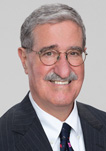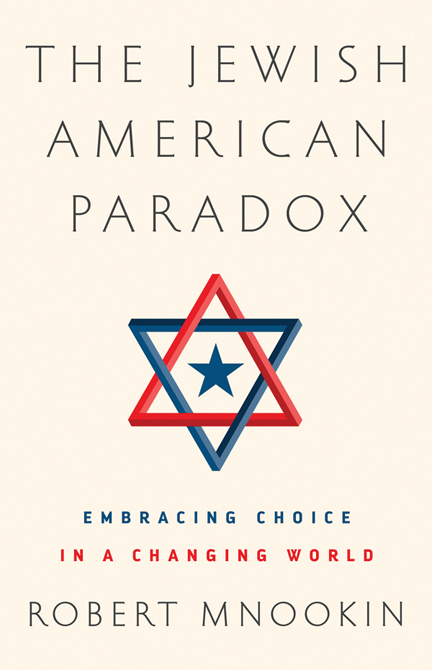 In a changing world, how can the American Jewish community survive and thrive? Author Bob Mnookin has addressed the challenges that face the American Jewish community and his view on how to support the next generation in a stronger Jewish identity in his book, “The Jewish American Paradox: Embracing Choice in a Changing World,” to be available Nov. 27.
In a changing world, how can the American Jewish community survive and thrive? Author Bob Mnookin has addressed the challenges that face the American Jewish community and his view on how to support the next generation in a stronger Jewish identity in his book, “The Jewish American Paradox: Embracing Choice in a Changing World,” to be available Nov. 27.
Mnookin has strong roots in the Kansas City Jewish community. The son of I.J. and Marion Mnookin, he grew up attending religious school at The Temple, Congregation B’nai Jehudah, although he had an attachment with Kehilath Israel Synagogue as well, since his paternal grandparents, Jacob and Dinah Mnookin, were members there. His maternal grandparents, George and Etta Sittenfeld, were also close by. He and his immediate family shared a two-story home with his aunt and uncle Leon and Jean Sittenfeld and their family.
“I feel a deep attachment to Kansas City and have real KC roots,” Mnookin said. His wife Dale’s sister, Barbara Brown, continues to live here.
Although his parents and grandparents were active in the Jewish community in different philanthropic organizations, his Jewish upbringing was limited.
“My religious school education was during the high watermark of Classical Reform Judaism,” Mnookin said. “There were no Bar or Bat Mitzvahs then, we were confirmed. The services had very little Hebrew, (they were) almost all in English. Alas, I learned no Hebrew.”
A 1960 graduate of Pembroke County Day School, Mnookin spent his summers attending camp at Oakwood Country Club, where he also hung out as a teen.
He left Kansas City to study at Harvard, then did a Fulbright Fellowship, and on to Harvard Law School, where he is currently the Samuel Williston Professor of Law, the chair of the Program on Negotiation, and the director of the Harvard Negotiation Research Project. As part of his work as a neutral arbitrator or mediator, he has facilitated a number of confidential meetings related to the Israel-Palestinian conflict.
But before his work on negotiation and mediation, Mnookin focused on family law, foster care, child custody and other topics concerning children’s rights. His first book was “Child, Family and State.” He also began to work on barriers to negotiated resolution of conflict and did studies on custody issues in divorcing families.
In all, his life was more secular than focused on his Jewish heritage, but his views on Judaism were altered by one of his daughters, who wished to attend services and become a Bat Mitzvah. That started a change in the course of his personal religious world, which eventually changed even more with the birth of his grandchildren.
“What I discovered was that part of me really hoped that Eli (one of his grandsons) would grow up and take pride in his Jewish heritage and want to be Jewish,” Mnookin said. “I have never been religiously observant and lead a very integrated life, yet part of me cared. I wanted to explore more. My grandson was Bar Mitzvah. All four of my grandchildren have been Bar and Bat Mitzvah.”
Mnookin admits he is not employed as a professional in the Jewish community and his academic training has never been in Jewish studies. That didn’t stop him from writing this book, which he hopes will help “people get a better sense of our extraordinarily rich American Jewish heritage.”
The book describes “what the Jews have given to our country and what our country has given to the Jews.” He also hopes people will have a deeper understanding of the challenges facing the American Jewish community today.
He believes one of the community’s major challenges concerns who counts as a Jew. In the book he suggests a two-pronged standard for the “big tent” of the American Jewish community.
“For the American Jewish community as a whole, I think we should accept as Jewish anyone who publicly says they are Jewish,” he said. “I am not going to ask them if their mother was Jewish or whether they had some sort of formal religious conversion. Self-identification should be good enough to be welcomed under the big tent. But under the big tent there are all types of different organizations. There are different congregations (Reform, Conservation and Orthodox). I believe that any of these institutions under the big tent can define who can be a member in their specific organization. But they should not impose their standards to everyone under the big tent.”
He sees this also as a continuing discourse with Israel. He sees “the control of the Orthodox rabbinate and its claim to define who counts as Jewish and what constitutes authentic Judaism” as having a major impact on the U.S./Israel relationship, especially for young people.
In his view, as stated in his book, the biggest challenge to the American Jewish community is not intermarriage, but rather disengagement.
“Intermarriage in and of itself is not the problem,” he said, “because now many intermarried couples are raising children who think of themselves as Jewish. The most recent research suggests that a majority of millennials who are children of intermarriage are choosing to identify themselves as Jewish. Will the American community embrace these families and help them pass on the heritage to their children? I am optimistic.”
But he added, “Studies have shown that although intermarriage is certainly a challenge, the increasing ‘thinness’ of Jewish engagement generally, even among people who have two Jewish parents, is a more pressing concern. The greatest challenge, as I see it, is how to increase the quality of Jewish engagement in a world where intermarriage is not likely to decline.”
Another of his theories is there is a reduction of anti-Semitism in the United States, which is leading to intermarriage and lack of connection to Judaism. When asked if he thought the events in Pittsburgh last month impacts this theory, he said, “The terrible murders of 11 Jewish worshipers in a Pittsburgh synagogue is a powerful reminder that anti-Semitic extremists still exist in America and that their hatred can have deadly consequences. Continued vigilance is warranted. But the fact remains that Jews have achieved an unprecedented level of integration and influence in virtually every facet of American life. Jews are more accepted in America today than they have ever been, at any time or place in a Diaspora community. Since World War II, institutionalized anti-Semitism has virtually disappeared. Jews no longer face discrimination in employment, education or housing, and they are thriving in virtually every field of public life. According to the Pew Research Center, Jews are the nation’s most highly regarded religious group.”
Robert Mnookin will be in Kansas City on March 27, 2019, when he will speak about his book at the Plaza Branch of the Kansas City Library.




